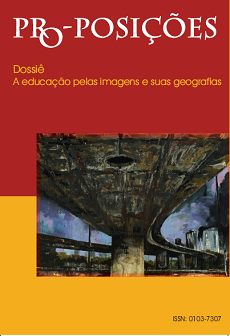Resumo
Nosso engajamento com o filme Tropa de elite, de 2007, do diretor José Padilha, é pertinente a discussões mais amplas acerca do papel do desejo e da lei nas formações de geografias do lugar. Em Tropa de elite, é a exploração das potencialidades transformadoras da lei, no mundo rotineiro e cotidiano, por intermédio de seu personagem principal, Capitão Roberto Nascimento (Wagner Moura), que evoca a verdadeira significação social e cultural do filme. Contextualizar a paisagem do Rio de Janeiro como uma ordem econômica singular, através da qual suas personagens literal e metaforicamente tiveram lucro e perderam, descortina Tropa de elite como um exemplo poderoso do que Deleuze descreveu como paisagens como estados mentais e estados mentais como cartografias, “ambos cristalizados um no outro, geometrizados, mineralizados”. Por intermédio das conexões e das dobras entre estados mentais, paisagens e cartografias, nós podemos ver como, por meio da transformação das paisagens e dos espaços urbanos em Tropa de elite, Padilha realiza uma tarefa qualitativa de expor forças, muitas vezes marginalizadoras e exploratórias, coladas ao espaço, à organização social, às políticas de lugar, ao consumo e à produção capitalistas.
Abstract: Our engagement with Jose Padilha’s 2007 film Tropa de elite is apropos to larger discussions of the role of desire and law in the formations of geographies of place. It is Tropa de elite’s exploration of the transformative potentialities of law within the everyday and mundane world through its central character, Captain Roberto Nascimento (Wagner Moura), that evokes the film’s true social and cultural significance. Contextualizing the Rio de Janeiro landscape as a particular economic order through which its characters have literally and metaphorically profited and lost uncovers Tropa de elite as a powerful example of what Deleuze) has described as landscapes as mental states, and mental states as cartographies, “both [of which are] crystallized in each other, geometrized, mineralized.” Through the connections and folds between mental states, landscapes and cartographies, we can see how, through the transformation of the urban landscapes and spaces within Tropa de elite, Padilha accomplishes a qualitative task of exposing often marginalizing and exploitative forces bound up in space, social organization, the politics of place and capitalistic production and consumption.
Keywords: Capitalism. Desire. Landscape. Law. Rio
Referências
BENJAMIN, W. The work of art in the age of mechanical reproduction. In: BENJAMIN, W. Illuminations. New York: Schocken, 1969.
BURITY, J. A. Brazil’s rise: inequality, culture and globalization. Futures, v. 40, n. 8, p. 735- 747, 2008.
CATTERALL, B. Is it all coming together? Thoughts on urban studies and the present crisis: (15) Elite squads: Brazil, Prague, Gaza and beyond. City, v. 13, n. 1, p. 159-171, 2009.
CURTI, G. H; DAVENPORT, J.; JACKIEWICZ, E. Concrete Babylon: life between the stars. To dwell and consume with(in) the fold(s) of Hollywood, CA. Yearbook of the Association of Pacific Coast Geographers, n. 69, p. 45-72, 2007.
DELEUZE, G. Foucault. Minneapolis: University of Minnesota Press, 1988.
DELEUZE, G. Cinema 2: the time-image. Minneapolis: University of Minnesota Press, 1989.
DELEUZE, G.; GUATTARI, F. Anti-Oedipus: capitalism and schizophrenia. Minneapolis: University of Minnesota Press, 1983.
DELEUZE, G.; GUATTARI, F. Kafka: for a minor literature. Minneapolis: University of Minnesota Press, 1986.
DELEUZE, G.; GUATTARI, F. A thousand plateaus: capitalism and schizophrenia. Minneapolis: University of Minnesota Press, 1987.
DIKEN, B. City of God. City, v. 9, n. 3, p. 307-320, 2005.
DONALD, J. Imagining the modern city. Minneapolis: University of Minnesota Press, 1999.
DOVEY, K. The silent complicity of architecture. In: HILLIER, J.; ROOKSBY, E. (Ed). Habitus: a sense of place. Burlington, VT: Ashgate Publishing Co, 2005.
HAY, J. Piecing together what remains of the cinematic city. In: CLARKE, D. B. (Ed.). The cinematic city. New York: Routledge, 1997 LEFEBVRE, A. The image of law: Deleuze, Bergson, Spinoza. Stanford, CA: Stanford University Press, 2008.
MASSEY, D. For space. London: Sage Publications, 2005.
MASSUMI, B. A user’s guide to capitalism and schizophrenia: deviations from Deleuze and Guattari. Cambridge, MA: The MIT Press, 1992.
MITCHELL, D. Cultural Geography: a critical introduction. Oxford: Blackwell Publishers, 2000.
MITCHELL, D. The right to the city: social justice and the fight for public space. New York: The Guilford Press, 2003.
PIKE, B. The city as image. In: LEGATE, R.; STOUT, F. (Ed.). The city reader. New York: Routledge, 1981.
PILE, S. The body and the city: psychoanalysis, space and subjectivity. London: Routledge, 1995.
PILE, S.; THRIFT, N. Introduction. In: PILE, S.; THRIFT, N. (Ed.). Mapping the subject: geographies of cultural transformation. London: Routledge, 1995.
SCHUBERT, J. From a politics of transgression toward an ethics of reflexivity. American Behavioral Scientist, v. 38, n. 7, p. 1003-1017, 1995.
SOBCHACK, V. Cities on the edge of time: the urban science fiction film. East – West Film Journal, v. 3, n. 1, p. 4-19, 1988.
SPINOZA, B. Ethics. London: Penguin, 1996.
WALTHER, M. Negri on Spinoza. In: Spinoza: issues and directions. The Proceedings of the Chicago Spinoza Conference. Leiden: Brill Academic Publishers, Incorporated, 1997. p. 286- 297.
A Proposições utiliza a licença do Creative Commons (CC), preservando assim, a integridade dos artigos em ambiente de acesso aberto.

